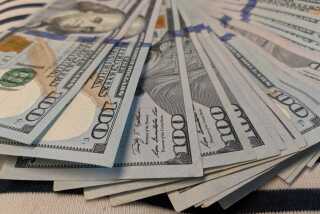Dollar Is Gaining Strength Against Euro as Year Ends
- Share via
On the verge of notching its biggest one-year gain against the euro, the dollar may show even more strength during the last week of the year, a Bloomberg News survey shows.
Of 49 traders, strategists and investors surveyed Thursday and Friday from Sydney to New York, 53% advised buying the dollar against the 12-nation currency, up from 31% a week earlier. A majority also recommended buying the dollar versus the yen, compared with 28% last week.
The U.S. currency is up about 14% this year against the euro and the yen after the Federal Reserve repeatedly raised interest rates. It’s the greenback’s biggest annual gain against the euro since the multinational currency was introduced in 1999.
A report due out today is expected to show U.S. consumer confidence climbed to the highest level since before Hurricane Katrina destroyed Gulf Coast oil rigs and sent crude prices to record highs, economists said.
“The dollar is going to prove resilient, and we could see further gains,” said Neil Mackinnon, a partner at currency hedge fund ECU Group. “Higher rates have supported the dollar all year, and with more work to do by the Fed, I can’t see that changing.”
The dollar rose 1.3% last week against the euro to $1.187 and 0.5% to 116.22 versus the yen.
Mackinnon said the U.S. currency might strengthen to $1.15 per euro and 125 yen in the next three months.
Investors bought the dollar this year because U.S. bonds have been paying higher yields than European and Japanese debt. Two-year Treasuries yielded 4.21 percentage points more than Japan’s similar-maturity government bonds in November, the most since May 2001.
Foreigners held a net $2.1 trillion of U.S. government debt at the end of October, an increase of $217 billion this year, the most recent data from the Treasury Department show.
Fed policymakers have raised rates 13 times since June 2004 while the European Central Bank has increased its benchmark once and the Bank of Japan has kept rates near zero. The Fed is expected to lift rates twice more by June, to 4.75% from 4.25%, and the European Central Bank may boost borrowing costs once to 2.5% from 2.25%, Bloomberg News surveys show.
“There are continued expectations of more Fed rate increases, whereas with other central banks we may only see a one-off move here and there,” said Tim Mazanec, a strategist at Investors Bank & Trust Co. “The reasons to be in the dollar outweigh any other currency.”
Jean-Claude Trichet, president of the European Central Bank, last week reiterated that policymakers weren’t planning a series of interest rate increases.
Bank of Japan Gov. Toshihiko Fukui said Dec. 22 that Japan’s consumer prices probably would show stable gains early next year and that the chances that the central bank would end its deflation-fighting policy were rising.
With Japan’s policymakers talking about rising interest rates, traders may reverse bets that the yen will fall, said Brian Taylor, chief currency trader at Manufacturers & Traders Trust. The yen showed strength against the dollar earlier this month.
Still, investors are less likely to buy the yen because any rate increases by the Bank of Japan will lag behind those of the Fed, said Etsuko Yamashita, a currency analyst at Sumitomo Mitsui Banking Corp. in Tokyo.
“The yen is still poised to fall, and the recent fall of the dollar was a short-term movement,” Yamashita said. The timing of the Bank of Japan’s end to its zero-interest-rate policy “is still unknown and Japanese investors’ desire to invest their funds abroad is still strong.”
More to Read
Inside the business of entertainment
The Wide Shot brings you news, analysis and insights on everything from streaming wars to production — and what it all means for the future.
You may occasionally receive promotional content from the Los Angeles Times.








